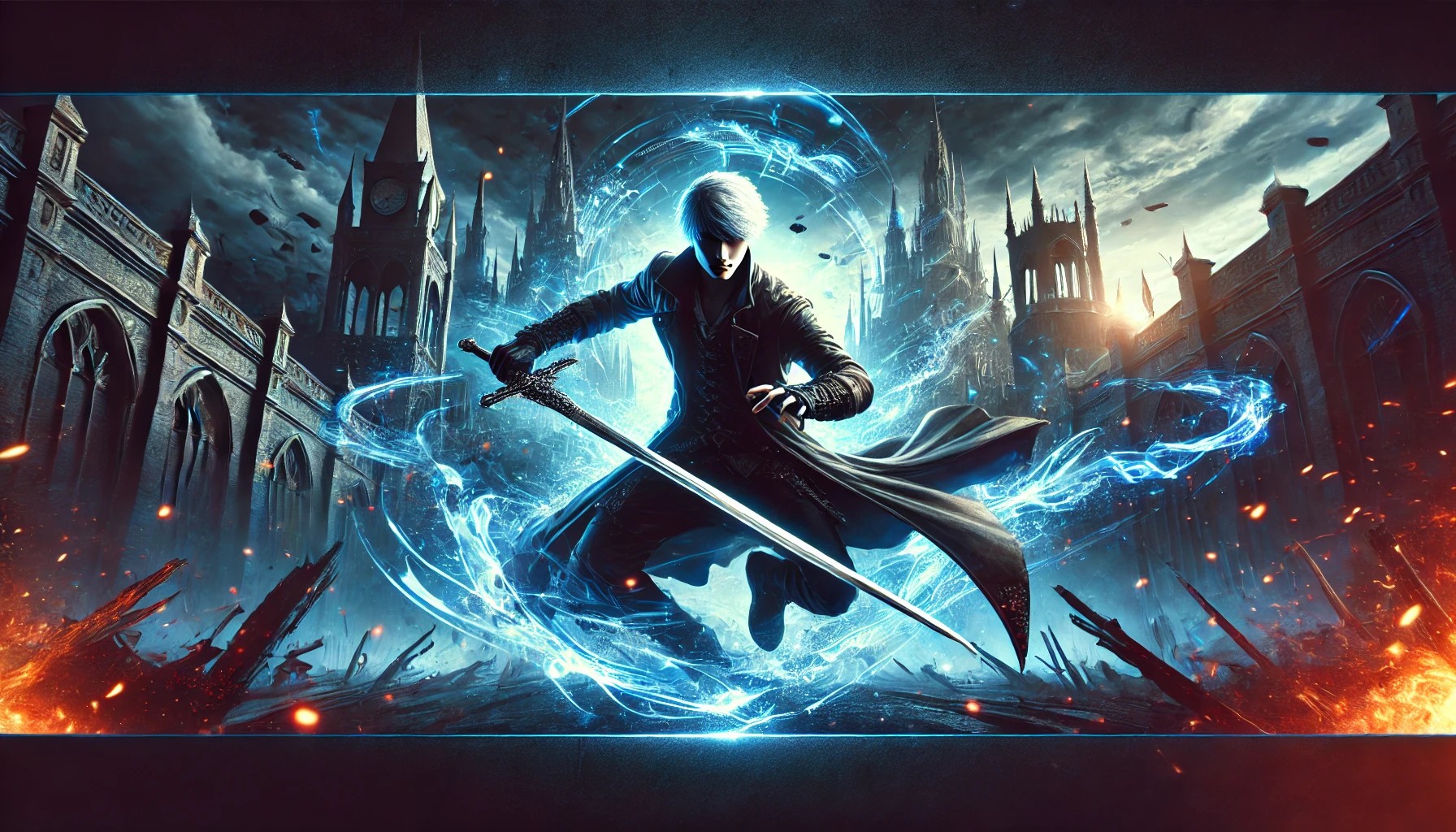Over two decades have passed since Capcom introduced the world to Devil May Cry, a stylish and action-packed property that pioneered the hack-and-slash genre on the PlayStation 2. With its unique gothic setting and signature blend of sword-and-gun combat, the series quickly enthralled players who craved relentless action. Now, rumors are intensifying that Capcom may develop a remake of the original Devil May Cry, in part because of recent remarks from Vergil’s voice actor. Although nothing has been officially confirmed, fans and observers throughout the gaming community are examining every clue to determine whether the demon-hunting saga will soon be reborn with updated technology and design.
The Iconic Status of Devil May Cry’s Early Installments
Devil May Cry’s first installment had a massive impact when it arrived on the PS2, introducing a formula that balanced frantic combos with cinematic flair. The game’s fast-paced combat, sprinkled with puzzle-like exploration in a gothic mansion, earned praise for its atmosphere and refined difficulty. Many players still regard it as a vital moment in Capcom’s history, standing alongside classic Resident Evil titles in terms of innovation. The follow-up releases, spanning Devil May Cry 2 through Devil May Cry 5 and including a controversial reboot, contributed to a legacy that remains influential today. Yet the original adventure retains a special resonance for longtime fans, who often revisit it to relive the confident swagger of protagonist Dante and the chilling menace of demonic adversaries.
Over time, discussions arose about how the earliest entries might fare in a modern context. The fixed camera angles, while distinctive, felt dated to players accustomed to full 3D movement. Control schemes and visual fidelity also showed their age when compared to newer titles in the genre. Given Capcom’s successful pattern of remaking Resident Evil classics, many fans speculated that Devil May Cry could receive similar treatment. The current rumors, spurred on by remarks from Vergil’s voice actor, have lent this speculation fresh urgency.
Vergil’s Voice Actor: The Clues and Hints
Much of the current excitement hinges on comments made by Daniel Southworth, the voice actor behind Vergil. Although his statements never overtly confirmed a Devil May Cry remake, they seemed to drop tantalizing hints that a new project might be in progress. According to reports from TheGamer and PSU, fans pored over his phrasing in interviews, suspecting that he might be involved in early recordings or at least aware of Capcom’s broader plans. Even a small slip or an ambiguous nod can rattle the Devil May Cry fanbase, which is known for fiercely following every update about Dante, Vergil, and the property’s direction.
In the original Devil May Cry, Vergil’s presence was minimal, overshadowed by Dante’s immediate conflict with the primary villain Mundus. However, subsequent installments fleshed out Vergil’s story, especially Devil May Cry 3, in which the character emerged as a central rival. The possibility of a remake incorporating greater Vergil content has fueled speculation that Capcom could retcon aspects of the first game to align more closely with established lore from the sequel or prequel arcs. Many supporters of the series embrace the possibility of seeing Vergil integrated from the beginning, though purists may worry about rewriting classic story beats. For now, the conversation remains hypothetical, but the voice actor’s remarks have proven enough to ignite widespread theories.
Capcom’s Remake Strategy: Lessons from Resident Evil
Over the past several years, Capcom has displayed a knack for reimagining older hits, notably through the Resident Evil 2 and Resident Evil 4 remakes. These projects balanced faithfulness to the original source with extensive quality-of-life improvements, new engine capabilities, and augmented story elements. Critics and fans lauded them for preserving iconic set pieces while modernizing controls, visuals, and in some cases, narrative coherence. Observers within the Devil May Cry fandom sense a parallel in how Capcom might approach retooling Dante’s earliest mission. If the publisher invests resources akin to its Resident Evil overhauls, a revamped Devil May Cry could emerge as more than a superficial remaster, carrying new game mechanics and even expanded storylines.
The possibility of a thorough remake does pose questions about creative direction. Would Capcom maintain the linear mission structure and emphasis on environment-based puzzles? Or might they shift to a more open design reminiscent of modern action titles that use fluid camera systems and large-scale encounters? On one hand, the series has always drawn on a corridor-like approach to levels, encouraging short bursts of combat culminating in stylish ranks. On the other hand, the momentum from the success of Devil May Cry 5 and Capcom’s RE Engine suggests a willingness to innovate.
Potential Changes in a Devil May Cry Remake
When fans imagine a Devil May Cry remake, they tend to fixate on specific areas that could benefit from updated design. First among them is the camera, which in the original game relied heavily on fixed angles reminiscent of Resident Evil. While it added a certain cinematic effect, many players found it disorienting during fast-paced demon fights. A remake could implement a more dynamic or player-controlled camera, potentially elevating the sense of agility for which the franchise is known.
Visual improvements also loom large. The original game’s corridors, ornate halls, and demonic influences could flourish under modern graphical technology. Textures once limited by early 2000s hardware might be replaced with stunning detail. Boss encounters such as Phantom, a giant lava-spider, and Nelo Angelo could evolve into more complex multi-phase battles, integrating advanced animation and AI. The notion of reimagining these duels with new mechanics, or weaving in cameo appearances by beloved characters from the broader saga, has supporters speculating that Capcom might unify the entire franchise’s lore in a single retelling.
Another possibility involves adjusting difficulty and progression. The first Devil May Cry was known for its challenging encounters, but the more punishing aspects could deter modern players accustomed to accessible design. Some fans prefer a faithful approach, wanting to keep the high challenge level intact, while others see room for optional difficulty modes or refined checkpoint systems that reduce frustration. Balancing the original spirit with up-to-date sensibilities remains a crucial conversation that only official announcements can resolve.
Balancing Nostalgia and Modernization
Nostalgia plays a significant role whenever older titles are remade. Many players hold emotional ties to Dante’s maiden voyage, recalling the awe of first discovering his flamboyant fighting style. Reimagining the game raises the possibility of diminishing that sense of nostalgia if changes go too far. Longtime enthusiasts love the game’s sense of oppressive isolation and its interplay between horror elements and brash action. If a remake toned down the shadowy corners or replaced them with overly bright set pieces, it might lose part of its original charm.
At the same time, developers often find that certain gameplay features need a major overhaul to appeal to new audiences. The fixed camera stands as a prime example. There is an entire generation of gamers who grew up with free camera controls, and discovering a fixed view might feel regressive or frustrating. Similarly, the archaic inventory system or puzzle designs might need rethinking. The tension between loyal replication and modernization can generate spirited debates among fans, each side passionate about preserving or enhancing the old design. Capcom’s track record with Resident Evil remakes suggests they can navigate such tensions adeptly.
Community Reactions and the Future of the Franchise
The flurry of chatter on social platforms, from Reddit threads to Twitter posts, demonstrates the devotion the Devil May Cry community still has for the original game. Each piece of alleged inside information or cryptic tweet from an actor or developer triggers waves of speculation. Daniel Southworth’s comments about Vergil seem like a typical spark that might precede a big reveal. Although he has not provided direct confirmation, the pattern of voice actors dropping subtle hints has often proved accurate in the past. Fans dissect every phrase for potential clues about whether they can expect an announcement at a gaming convention, or a special event orchestrated by Capcom.
Beyond a potential remake, observers wonder if the rumored project might lead to expanded spin-offs or other cross-media expansions. The series has experimented with anime adaptions and cameo appearances in titles like Marvel vs. Capcom. If Capcom invests in a thorough remake that reignites mainstream interest, it might pave the way for additional merchandising and broader narratives. Characters like Lady or Nero could receive cameo references in the retold storyline, thereby linking it more seamlessly to Devil May Cry 5. The result could be a cross-franchise synergy that cements the property’s longevity.
In the interim, fans remain watchful of any official statement from Capcom. The publisher is known for strategic rollouts of announcements, often timed to coincide with major events like E3 or Tokyo Game Show. Devotees hold out hope that the rumored DMC remake could surface sooner rather than later, riding a wave of hype built on the success of Resident Evil remakes. If realized, this new version of Dante’s first demon-slaying escapade might bring together classic set pieces, modern design flourishes, and possibly an expanded role for Vergil that acknowledges deeper arcs introduced in later entries.
A Legacy That Continues to Intrigue Gamers
Until Capcom confirms or denies these speculations, the rumor about a Devil May Cry remake sparked by Vergil’s voice actor highlights the enduring resonance of the original. Gamers who experienced the adrenaline rush of chaining combos, exploring moody corridors, and squaring off against monstrous bosses in 2001 might soon have a chance to return to that world with sharper visuals and refined gameplay. Meanwhile, newcomers unfamiliar with the series’ early design could find an accessible entry point that delivers the essence of stylish demon-hunting without the trappings of antiquated mechanics.
The mere possibility of this project underscores how strongly players continue to gravitate toward the concept of fast-paced swordplay, melodramatic storytelling, and the dualities that define Dante and Vergil. A refreshed look at the saga’s genesis might deepen existing lore in ways that further tie the first game to subsequent sequels. For a franchise that has always embraced the theatrical side of supernatural action, a remake stands to reaffirm how devilishly fun and timeless the core gameplay loop remains. Admirers of the franchise now watch for any sign of official confirmation, curious to see if the glimpses from voice actors and industry insiders will translate into a spectacular rebirth of Capcom’s demon-slaying masterpiece.

